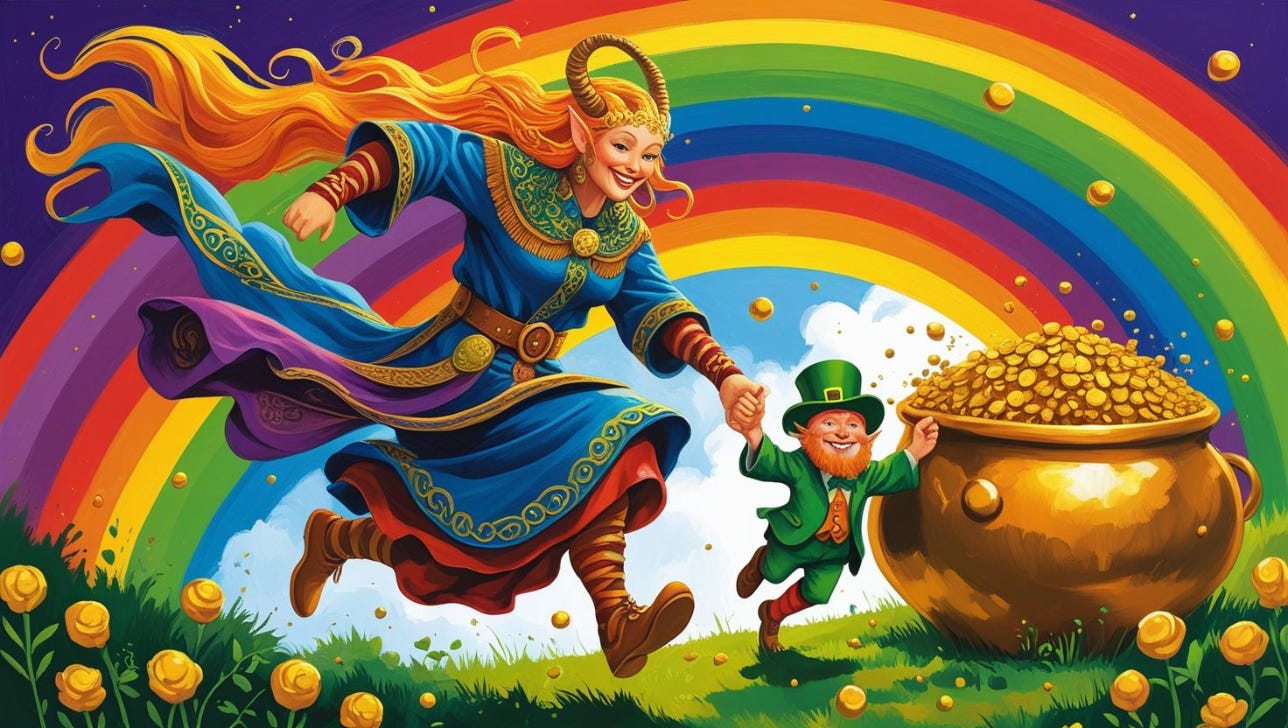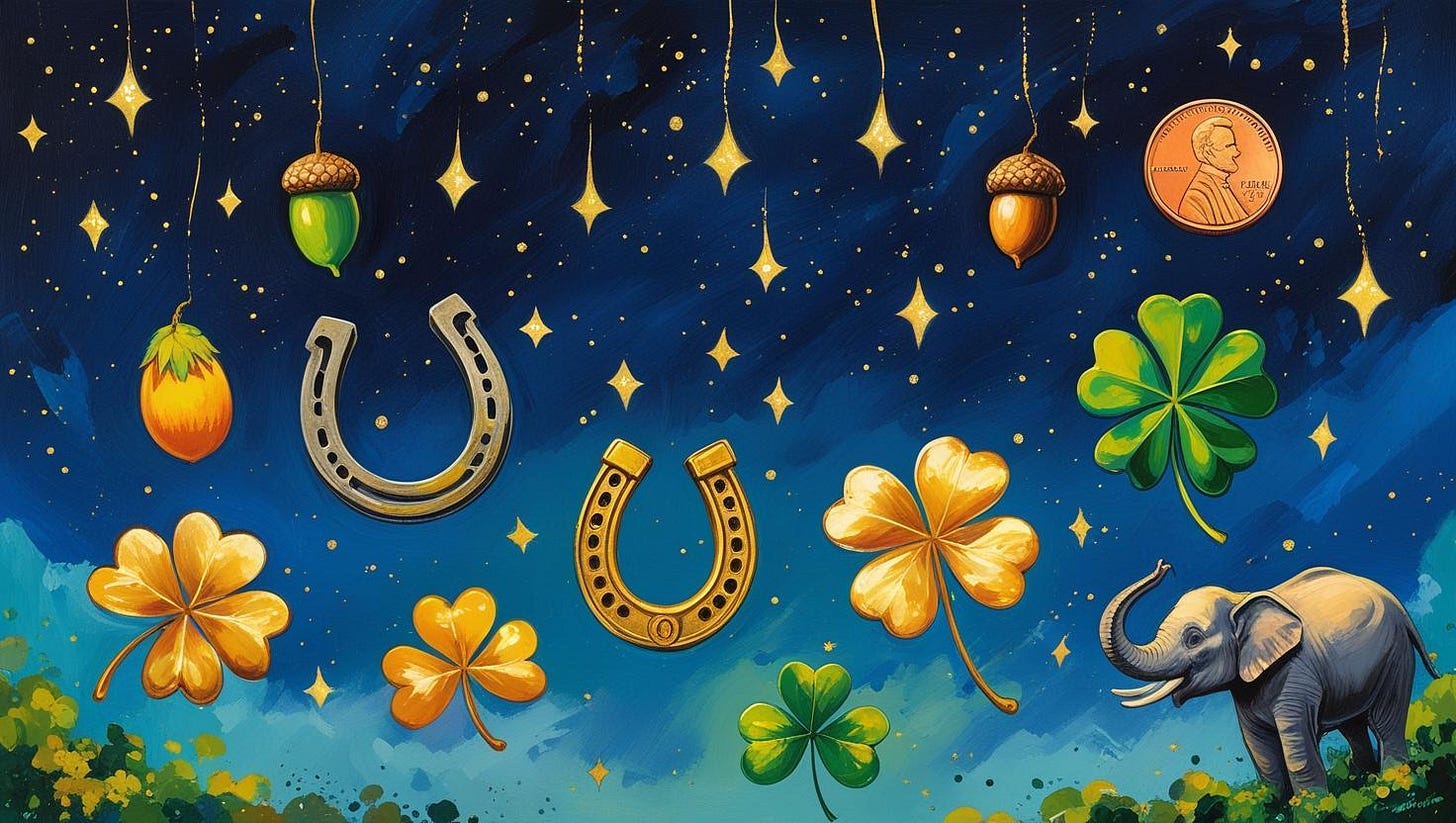Luck
Origins and Possibilities
Luck
What is it? Why is it abundant in times, and scarce in others? In previous posts, I have explored Santosha, or the Sanskrit for contentment. After I started embodying this philosophy in October, it seems good luck followed me at every step.
Around that time, I happened upon a study where participants with similar perceived levels of “good luck,” and likewise a group who viewed themselves with “bad luck” were tracked and interviewed. It is not surprising that those who perceive themselves as lucky tend to have more opportunity and perceived success.
As someone who feels the Irish in their blood, I’ve often wondered how the Irish came to apply “good” and ‘bad” chance with the influence of the luck of an individual, family, town, and so on. Surely you’ve heard of “The Luck of the Irish,” or a lucky shamrock. My Irish ancestors experienced much bad luck, according to family stories, but they also ran their mouths, did they get what was coming to them?
Much of the Irish concept of luck — ádh mór— is similar to that of Karma, i.e. the deeds you do can affect your relationship with the other-world, sometimes referred to as the “Fairyluck.” My sister and I listened to a podcast which highlighted an Irish man who had experienced bad luck most of his life. He believed his family had been cursed, a punishment for immoral behavior. The curse was even recorded in an old document on public display with very specific punishments. Mugged and stolen wallet, lost his job, one by one the curse came true. Of particular note was his inability to grow cabbages, comparing his own with his neighbors. Once the curse was lifted, and his poor relationship with the other-world resolved, he was suddenly able to grow beautiful cabbages, and a whole string of good fortune came his way.
I’ve always resonated with the term, “What goes around comes around.” This makes me grateful for the good fortune I do receive, but also gives me some agency in creating good fortune.
With most of my genes on both sides being from Germany —shh, my Irish genes think they have all of me—I’ve wondered how agency has affected my view of luck, or Glück. About 100 years before my ancestors hopped a steamer from Hamburg to the “New World,” Gottfried Wilhelm Leibniz scribbled —in a very “German” way— that all phenomena must have a rational reason to explain them. This is a great concept his progeny likely used to over-engineer automobiles and make electronic dance beats. That being said, Liebniz also believed that “God” would create the “best of all possible worlds.” He claimed that these conflicting ideas could actually support each other, in that luck was earned through moral virtue. Wow, things are getting technical. Let’s go even deeper, Liebniz was a member of a group of free-thinkers, enlightenment figures that used their leisure time to think and write. These free-thinkers were critical and warned us to avoid so-called “agentic phenomenon,” in which outcomes are tied to an authority figure’s influence. A few hundred years later Nazi criminals at Nürnberg demonstrated the pitfall Liebniz warned of by claiming“they had simply followed orders,” it did not hold up well in court.
This might be as close as Liebniz and his contemporaries got to exploring luck from a what goes around comes around viewpoint, one where we all are responsible for our own luck based on how we treat others, and perhaps ourselves. On the flip-side, pagan remnants in historic Germany attributed many outcomes to the alignment of planets and stars. The cosmos is something I’ve often blamed for misfortune, darn Jupiter and her 95 moons acting up again —grrrr. Critics might say I’m not taking agency for my choices, but I see it as a great way to laugh off my problems.
I’ve often turned to laughter in the face of hardship. Could this be my Norse genes acting up? While my Norse genes are few, they likely came from Vikings that raided Ireland. Some believe Viking warriors used laughter as a means of facing deadly seas, battles, and other dangers. The Norse joined the rest of humanity in having a spiritual component to luck, Hamingja (Ha-mee-Yah). Hamingja is a sort of female spiritual guardian, whose image I included with the Leprechaun above. Her meddling in the affairs of the “lucky” passed to their family when they died. Did I inherit Hamingja’s guardianship? People living in one of the hardest places to eek out sustenance perceived her on the side of those who found good fortune.
Again we return to the concept that those who perceive they are lucky, will have good luck. It’s a feedback loop. In my contemporary life, I keep hearing the term, “blessing in disguise.” What influence does this belief have on our perception of luck? When we receive a dish we did not order at the Thai restaurant, we can make a big fuss, or we can relish in the opportunity to try something new, i.e. find the silver lining. Luck researcher Richard Wiseman suggests that lucky people are more open to opportunities. In fact, “creating and noticing opportunities” are one of his four factors that contribute to perceived luck, positive expectations are another. Recently I was away at Mountain Film in Telluride. While away, I would not be able to water my garden. In previous weeks if I missed a day, the plants died. I decided to believe that my plants would survive anyway —positive expectations— and they did! Luck? Hamingja? Glück? Fairy luck (ádh mór)? What do you think?
As part of my exploration of Santosha, my gratitude for the luck I have is amplified by my belief that it all could change drastically tomorrow. I don’t think on this with worry, partly because my good luck has always put me back on my feet 😉. However I do think my belief that good luck is always just around the corner, has attributed to my own resiliency. My agility in the face of challenge is something for which I have always thanked my ancestors. I feel my grandfathers in the mitochondria of my cells. They are laughing and nudging me on. When I lose something, they tell me I don’t need it anymore. When I gain, they laugh, saying amongst themselves, “why is he always the lucky one?” So I compel you to feel lucky. That your ancestors arrived here and now in you is proof enough.




This reminds me a bit of a couple of books of essays I enjoyed long ago by Diane Ackerman.